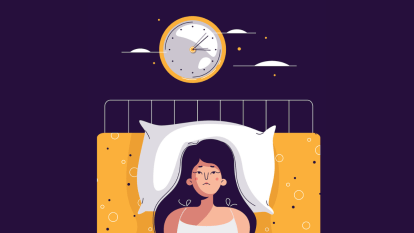Nightmares Have Increased Since the Pandemic — Here’s How to Get the Rest You Need
You deserve sweet dreams.

The COVID-19 pandemic changed the architecture of our world. For a time, face-to-face interactions disappeared; we feared for the health of ourselves and our loved ones; and our financial situations and work lives became more fraught. The stress of the pandemic was powerful — so powerful, in fact, that it invaded our subconscious minds and showed up in our sleep.
Recent research shows that many people experienced more nightmares during COVID-19 isolation. Keep reading to learn about the implications of this finding and what to do if you’re suffering from nightmares.
What are nightmares?
Have you ever found yourself standing in front of a crowd, only to look down and realize you’re naked? Or maybe you’re back in school, and suddenly it’s the day of an important exam that you never studied for. Perhaps you’re being chased by a hungry bear, but for some reason, your legs won’t move, and you can’t run to safety. Then you wake up — heart pounding — only to realize it was just a nightmare. While these scenarios are only happening in your unconscious mind, the fear and vulnerability you feel during bad dreams is very real.
The Sleep Foundation defines nightmares as disturbing, upsetting dreams — typically occurring in the latter half of your sleep cycle — that cause you to wake up. Although there is no scientific consensus about what causes nightmares, some experts believe they are an “emotional response to fear and trauma.” Others believe nightmares are a part of the brain’s “methods for processing emotion.” These findings make sense, given that those who have been through traumatic events often have recurring nightmares about their experience.
The Study On Nightmare Frequency
An international study published in August of this year set out to test the theory that the stresses of COVID-19, including financial burdens, isolation, uncertainty, and health concerns, led to an increase in nightmare frequency (NMF). To gather data, scientists measured NMF in 15,292 participants who responded to an online survey between May and August 2020. Of these participants, the average age was 41, and 64 percent of them were women. The study revealed that “high nightmare frequency increased significantly from 13.24 percent to 22.35 percent during the pandemic,” and that “financial burden due to the pandemic, confinement, having had COVID-19, and work situation during the pandemic were associated with nightmare frequency.” Scientists also noted that women had higher NMF than men, a finding that was consistent with the fact that on average, women generally have more nightmares than men.
The scientists concluded that the increased nightmares may be evidence of collective trauma from the pandemic, and that because higher NMF was accompanied by higher rates of mental health issues in waking life, measuring nightmares might be a helpful tool in diagnosing psychological issues in the future.
Collective Trauma From COVID-19
What does it mean that society has suffered collective trauma? The study notes that because we are social beings, isolation and confinement — especially in times of uncertainty and fear — are in direct conflict with human nature. In addition to increased NMF, participants in 2020 suffered from higher than normal rates of depression, panic attacks, anxiety, and sleep troubles. Additionally, those who reported high levels of pandemic-related anxiety, had contracted COVID-19, had been confined for more than eight weeks, or had suffered financial hardship during isolation had the highest levels of NMF.
The study found that collective pandemic trauma not only increased nightmare activity, but also increased the frequency of COVID-related content within the dreams (in the form of nightmares about losing a loved one to the disease or being caught without a mask in a crowded place). “A qualitative study analyzing dream content confirmed COVID-19 related nightmare plots in 37 percent of the sample,” said the scientists conducting the study.
What to Do If You Experience Nightmares
Hopefully, you aren’t among those that suffer from frequent nightmares. But if you are, there are steps you can take to feel better. You can’t prevent nightmares entirely, but being aware of factors that contribute to an increased likelihood of nightmares can help. Here are three tips that may prevent some of those bad dreams.
Forego midnight snacks. As tempting as that late-night cold pizza may seem, it’s best to save it for tomorrow. WebMD notes that eating right before sleep can cause your brain to be more active, increasing the likelihood of nightmares.
Establish a consistent sleep routine. If you aren’t getting enough sleep, you may have a higher chance of experiencing nightmares. The CDC recommends going to bed and waking up at the same time every day, even on the weekends, to improve sleep health.
Get support. You deserve rest. Stress, depression, and anxiety can make nightmares a more likely and frequent occurrence. Take time to decompress, and don’t hesitate to talk to a doctor about your mental health.
Even if you’ve taken extensive measures, nightmares can still happen. If you’ve had one, it can be hard to relax and fall back asleep. Here are three tips for calming down after waking up from a bad dream, so you can recoup some much-needed rest.
Write it down. Getting the details of your nightmare out of your head and on to paper can help you realize that nothing bad happened in your waking life, and that some of the “scary” things that happened were actually just ridiculous.
Take a breather. Focusing on your breathing can help you recenter and relax. Try the 4-7-8 method, which is when you breathe in for four seconds, hold your breath for seven, and exhale for eight, repeating four times.
Distract yourself. Pick up a book and lose yourself in the story, listen to some calming music, or get up and go to a different room. These activities will take you out of the world your nightmare created and help you relax.
Stress is a natural part of life, but when it’s so powerful that it transfers into our subconscious, rest and relief can be hard to find. For some, the trauma of the pandemic has exacerbated this. If you’re among those experiencing persistent nightmares, remember to take care of yourself and seek peace wherever you can find it. If all else fails, consider consulting. a therapist or mental health expert.













